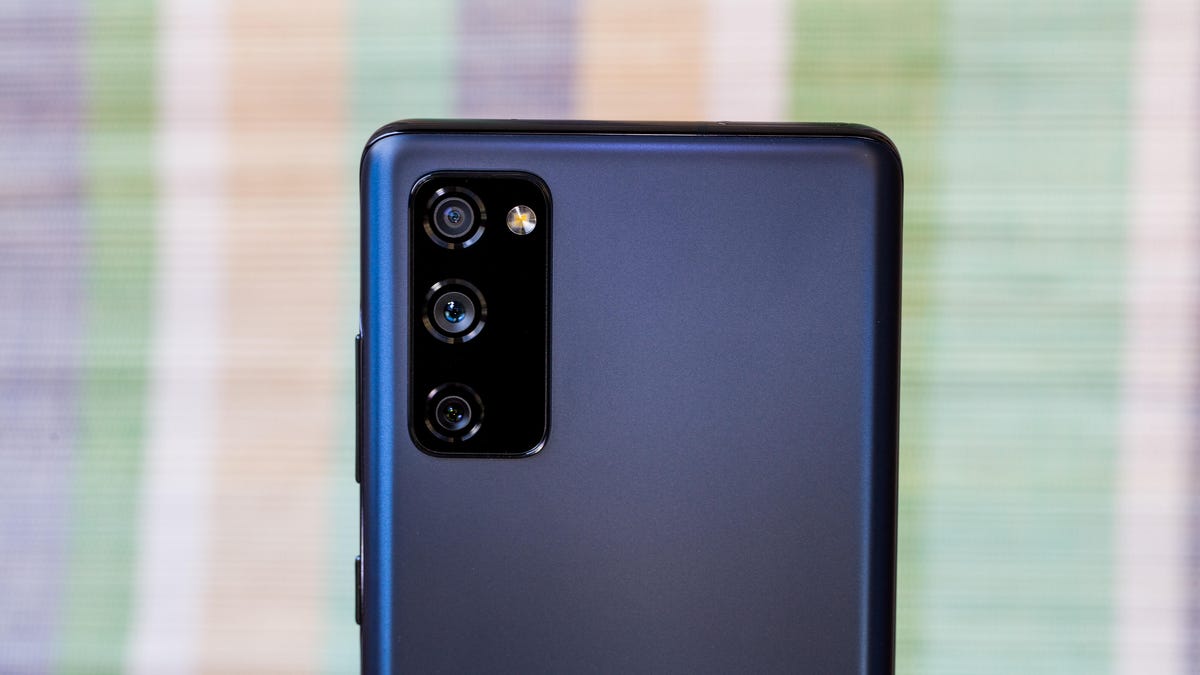Right before Galaxy S21 Unpacked, Samsung unveils new Exynos 2100 processor with improved 5G
Meet the chip that'll likely power the Galaxy S21 internationally.

Samsung's devices in the US, like the Galaxy S20 FE, have used Qualcomm modems to connect to cellular networks. But the company's new Exynos chip now can tap into fast millmeter-wave signals.
Samsung's Galaxy S21 launch isn't happening until Thursday, but that hasn't stopped the South Korean electronics giant from already introducing new products that'll likely tie into that event. They include a processor called the Exynos 2100, which Samsung unveiled Tuesday during a virtual press conference.
The new 5-nanometer chip features an eight-core CPU including an Arm Cortex X1 core, clocked at up to 2.9GHz, to go with three Cortex A78 cores and four power-efficient Cortex-A55 cores. Samsung says the new CPU should deliver a "more than 30% enhancement in multicore performance" than its predecessor. There is also an Arm Mali-G78 GPU to improve graphics by "more than 40%" as well as improved performance when handling intensive tasks like artificial intelligence.
The processor's image signal processor (ISP) is getting a boost and is now able to handle resolutions of up to 200 megapixels. It's capable of connecting up to six lenses and processing four of the feeds "concurrently," which allows for features such as improved zoom performance and better image quality when doing ultrawide shots.
Beyond the overall performance boosts, the Exynos 2100 also features an integrated 5G modem that includes support for both low-band and midband 5G (also known as sub-6GHz 5G) as well as the higher frequency form of 5G known as millimeter-wave. Samsung says its chip can handle maximum download speeds of 5.1Gbps over lower-band 5G and download speeds of up to 7.35Gbps over mmWave.
By comparison, Qualcomm's Snapdragon 888 chipset, which also has an integrated 5G modem, is capable of downloading data at up to 7.5Gbps and uploading information as fast as 3Gbps.
Samsung has a new flagship mobile processor, the Exynos 2100.
Though Samsung didn't formally announce that the new Exynos processor would power the Galaxy S21, it's heavily rumored that it'll be in some models, at least overseas. Samsung has generally used its own Exynos line for the international versions of its phones in places like South Korea, while the US models get Qualcomm processors, a trend that's expected to continue this year. San Diego-based Qualcomm unveiled the Snapdragon 888, its latest flagship chipset, in December and said it would be in phones in the first quarter.
Benefits of integration
Smartphones need a lot of components to operate, but two key parts that make a phone a phone are the application processor, which acts as the brains of a device, and a modem, which connects it to a mobile network. The first 5G devices needed standalone modems that worked alongside the main computing processor. That was because 5G technology was so new, it was too difficult to combine it with the brains. Integrating a modem with the brains of a phone comes with many benefits, including better battery life and lower cost.
Just being able to build mmWave chips is notable, but integrating mmWave into Exynos was no easy feat for Samsung. Of the four major companies designing modems -- Qualcomm, MediaTek, Samsung and Huawei -- only Qualcomm has actually developed a mmWave modem that's shipping in phones. And it only integrated 5G onto the same chip as the brains of a super-high-end phone with the Snapdragon 888. That hasn't yet appeared in any phones but is expected to power the Galaxy S21 lineup in the US and some other locations. Qualcomm's Snapdragon 765, unveiled in late 2019, integrated 5G, but the processor's features made it better suited for less-higher-end devices.
mmWave provides the superfast speed that's the hallmark of 5G, but the technology is also temperamental. The airwaves can't travel long distances, and they're easily blocked by trees, buildings, glass windows and even hands holding a device. To prevent a signal from being blocked, Qualcomm has developed modules that place antennas around different parts of a phone. Samsung didn't say how it prevents mmWave's problems, but it likely took a similar path to Qualcomm's modules.
Verizon has been the main company pushing mmWave technology. Its first 5G airwaves focused on the ultrafast connectivity, before it moved to build out its broader but slower 5G network. AT&T and T-Mobile also have small mmWave networks, but they've favored their broader networks. And few carriers outside the US have built out 5G mmWave networks.
An Exynos chip with mmWave is "potentially really good news for buyers outside of North America, where Samsung uses Qualcomm chipsets," Techsponential analyst Avi Greengart said. But "it's more of a specs thing, given that mmWave is not widely deployed outside of the US and is barely deployed inside the US."
That could change, though. In December, Qualcomm's then-president, who'll take on the role of CEO this summer, told CNET that mmWave is being deployed in more places around the world.
"Coverage is going to be built everywhere," Qualcomm's Cristiano Amon said. "And we see it with mmWave happening in more places." Singapore and South Korea have joined the US and Japan in building out the technology, and 130 operators are now investing in the technology, he said.
Samsung says the new Exynos is now "in mass production."



